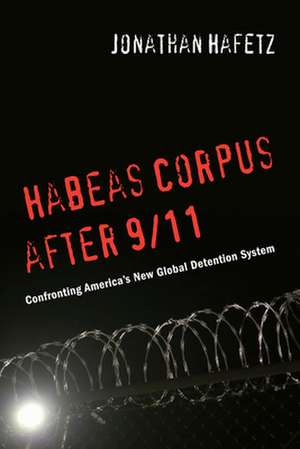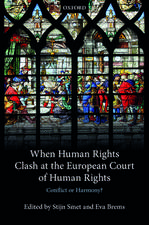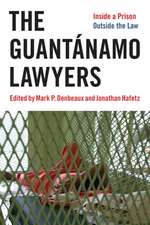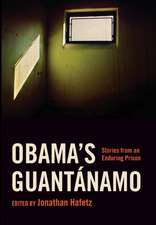Habeas Corpus after 9/11 – Confronting America′s New Global Detention System
Autor Jonathan Hafetzen Limba Engleză Paperback – 19 aug 2012
| Toate formatele și edițiile | Preț | Express |
|---|---|---|
| Paperback (1) | 243.58 lei 6-8 săpt. | |
| MI – New York University – 19 aug 2012 | 243.58 lei 6-8 săpt. | |
| Hardback (1) | 528.99 lei 6-8 săpt. | |
| MI – New York University – 3 ian 2011 | 528.99 lei 6-8 săpt. |
Preț: 243.58 lei
Nou
Puncte Express: 365
Preț estimativ în valută:
46.61€ • 48.79$ • 38.57£
46.61€ • 48.79$ • 38.57£
Carte tipărită la comandă
Livrare economică 07-21 aprilie
Preluare comenzi: 021 569.72.76
Specificații
ISBN-13: 9780814724408
ISBN-10: 081472440X
Pagini: 332
Dimensiuni: 152 x 229 x 18 mm
Greutate: 0.45 kg
Editura: MI – New York University
ISBN-10: 081472440X
Pagini: 332
Dimensiuni: 152 x 229 x 18 mm
Greutate: 0.45 kg
Editura: MI – New York University
Recenzii
Deftly connecting Guantánamo to other secret prisons, law to politics, secrecy to terror, and the efforts of the courts to frame and reframe the ancient writ of habeas corpus for a modern era, Hafetz explores what was lost when habeas became a legal question as opposed to an answer. Anyone seeking a way forward on the issues of detention, incarceration, and the rule of law that continue to plague us would be well advised to start looking here for the answers. Dahlia Lithwick, Slate.comWe all have snatches of the conversation in our heads: Guantánamo, habeas corpus, enemy combatant, military commissions, Bagram, rendition and torture. This book by one of the key lawyers on the front lines in the post-9/11 legal battles puts these pieces together; what emerges is not pretty. If you want to understand how a country that claimed it was the paradigm of fair treatment in its criminal justice system has tailored its laws to expediency, read this disturbing book." Michael Ratner, President, Center for Constitutional RightsThe right to habeas corpus is the linchpin of a free nation, and the post-9/11 attack on this safeguard is thus one of the most significant erosions of freedom in many decades. Jonathan Hafetz provides the most thorough account yet of why this right matters so much and what should be done to preserve it." Glenn Greenwald, Salon.comHafetz's incisive and insightful volume is more than just a summary of where we have been; it is an impassioned case for the proper way forward with regard both to the substance of national security detention policy and the role courts should play in reviewing and constraining it. Certain to become one of the indispensable accounts of the role that the 'Great Writ' has played both historically and after September 11, this book provides a powerful and timely testament to the foresight of the Founding Fathers in expressly enshrining the 'privilege of the writ of habeas corpus' in our Constitution. Stephen Vladeck, Professor of Law, American University
"Deftly connecting Guantanamo to other secret prisons, law to politics, secrecy to terror, and the efforts of the courts to frame and reframe the ancient writ of habeas corpus for a modern era, Hafetz explores what was lost when habeas became a legal question as opposed to an answer. Anyone seeking a way forward on the issues of detention, incarceration, and the rule of law that continue to plague us would be well advised to start looking here for the answers." Dahlia Lithwick, Slate.com "We all have snatches of the conversation in our heads: Guantanamo, habeas corpus, enemy combatant, military commissions, Bagram, rendition and torture. This book by one of the key lawyers on the front lines in the post-9/11 legal battles puts these pieces together; what emerges is not pretty. If you want to understand how a country that claimed it was the paradigm of fair treatment in its criminal justice system has tailored its laws to expediency, read this disturbing book." Michael Ratner, President, Center for Constitutional Rights "The right to habeas corpus is the linchpin of a free nation, and the post-9/11 attack on this safeguard is thus one of the most significant erosions of freedom in many decades. Jonathan Hafetz provides the most thorough account yet of why this right matters so much and what should be done to preserve it." Glenn Greenwald, Salon.com "Hafetz's incisive and insightful volume is more than just a summary of where we have been; it is an impassioned case for the proper way forward with regard both to the substance of national security detention policy and the role courts should play in reviewing and constraining it. Certain to become one of the indispensable accounts of the role that the 'Great Writ' has played both historically and after September 11, this book provides a powerful and timely testament to the foresight of the Founding Fathers in expressly enshrining the 'privilege of the writ of habeas corpus' in our Constitution." Stephen Vladeck, Professor of Law, American University
"Deftly connecting Guantanamo to other secret prisons, law to politics, secrecy to terror, and the efforts of the courts to frame and reframe the ancient writ of habeas corpus for a modern era, Hafetz explores what was lost when habeas became a legal question as opposed to an answer. Anyone seeking a way forward on the issues of detention, incarceration, and the rule of law that continue to plague us would be well advised to start looking here for the answers." Dahlia Lithwick, Slate.com "We all have snatches of the conversation in our heads: Guantanamo, habeas corpus, enemy combatant, military commissions, Bagram, rendition and torture. This book by one of the key lawyers on the front lines in the post-9/11 legal battles puts these pieces together; what emerges is not pretty. If you want to understand how a country that claimed it was the paradigm of fair treatment in its criminal justice system has tailored its laws to expediency, read this disturbing book." Michael Ratner, President, Center for Constitutional Rights "The right to habeas corpus is the linchpin of a free nation, and the post-9/11 attack on this safeguard is thus one of the most significant erosions of freedom in many decades. Jonathan Hafetz provides the most thorough account yet of why this right matters so much and what should be done to preserve it." Glenn Greenwald, Salon.com "Hafetz's incisive and insightful volume is more than just a summary of where we have been; it is an impassioned case for the proper way forward with regard both to the substance of national security detention policy and the role courts should play in reviewing and constraining it. Certain to become one of the indispensable accounts of the role that the 'Great Writ' has played both historically and after September 11, this book provides a powerful and timely testament to the foresight of the Founding Fathers in expressly enshrining the 'privilege of the writ of habeas corpus' in our Constitution." Stephen Vladeck, Professor of Law, American University
Descriere
Maintains that habeas corpus remains the single most important check against arbitrary and unlawful detention, torture, and the abuse of executive power
Cuprins
Contents; Acknowledgments vii; Introduction 1; Part I.; 1. Laying the Foundation for Prisons beyond the Law 11; 2. Guantánamo: Microcosm of a Prison beyond the Law 39; 3. Guantánamo beyond Guantánamo: Towards a Global Detention System 61; 4. Crossing a Constitutional Rubicon: The Domestic Enemy Combatant Detentions 93; Part II.; 5. Habeas Corpus and the Right to Challenge Unlawful Imprisonment 110; 6. The Seeds of a Global Constitution 139; Part III.; 7. A Modest Judicial Intervention: The First Enemy Combatant Habeas Corpus Decisions 158; 8. The Battle for Habeas Corpus Continues 174; 9. Striking a Blow against Prisons beyond the Law: Guantánamo Revisited 205; Part IV; 10. Towards a Better Understanding of Habeas Corpus: Individual Rights and Separation of Powers during Wartime 237; 11. Some Potential Limits of Habeas Corpus 271; 12. Terrorism as Crime: Towards a Lawful and Sustainable Detention Policy 291; 13. Continuity and Change: The Detention Policies of a New Administration 342; Notes 369; Index


















